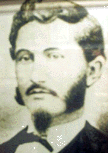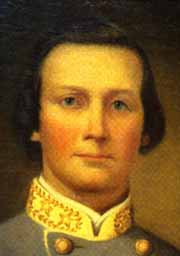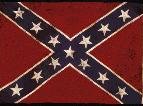South Carolina
C.S.A.

The Joe Alexander Story"

South Carolina
C.S.A.
|
South Carolina C.S.A.
|

|
The Joe Alexander Story"
|

|
South Carolina C.S.A. |
|
Company B Sixteenth South Carolina |
|
Mrs. C.E. Robinson Alexander, Richard H.,Captain, Company B, Sixteenth South Carolina, Present at the Surrender, Wounded at Jonesboro, Georgia. Alexander, W.J.,Lieutenant, Company K, Promoted from Private Company B, Killed in Action at Lovejoy Station, Georgia. It is suggested that there are two sets of Alexander brothers, Richard H. Alexander, Joseph Carson Alexander and William Johnson Alexander, the children of William Magness and Martha Ann McDaniel Alexander. James A. Alexander, Thomas Alexander and William W. Alexander are the children of Elijah and Tabitha Payne Alexander. E-Mail Descendant He has always been a man of a high sense of honor, a Christian gentleman of the old type, cherishing and deserving the best esteem of his fellow men. His war record is filled with daring deeds of bravery and is remarkable for the fact that he was a mere lad in years. When he was only fourteen, he begged his aunt to let him go to the war. Her tender loving heart was closely entwined about the bright, happy, sunny-faced boy, Joe, the youngest baby - one of her adoption. But a more patriotic heart never beat than hers. She always urged her boys to stand up for their country, and felt proud of the gallant ones already gone on to the front. So in March of 1861, Joe enlisted in Company "B", 16th South Carolina Volunteers, at Adams Run. In May, he went west and was in many of those hot battles around Vicksburg on to Jackson, fighting day by day on the Chickamauga and Missionary Ridge. After that he was ordered to the coast with the sixteen-year-old South Carolina boys, but changed his route when he reached Branchville and went to Dalton, Ga., where he joined his old command under his brother, Lieut. Richard Alexander. The Sixteenth was attached to Johnson's army in Mississippi but did little fighting here. I suspect Joe was a camp follower until after his return to the unit at Dalton, Ga. Many very young boys tagged along with older brothers and fought without enlisting. The Confederate Army in the West was not too particular about your age if you wanted to shoot some Yankees. All you had to do was just tag along. Sadly, Yankees shot back and did a lot worse to boot. I have not looked at Joe's combined service record to check his date of enlistment. It is a fact worthy of mention that "Joe", as he was familiarly called, was a "high private" in the front rank, while his three brothers were all commissioned officers, and one was killed in battle. He was left alone with his faithful servant, Felix, who attended him until he was captured. (By the way, this faithful old man is now living near Pendleton, S.C.) I strongly suspect this was after Franklin and Joe was probably wounded at the battle and captured in December when the Union army rolled up the Confederates at Nashville and drove them back. I suspect Felix returned home after the defeat at Nashville, another man who chose family over freedom. Under the command of General Cheatham, he went to Franklin, Tenn. where they met the Yankees in a terrible conflict. This was a hard-fought battle and in the end the Confederates were defeated. Among the prisoners captured was our hero and a man of unique character named Ike Black, also from Greenville County, who was a droll uneducated fellow, but he had a heart of gold and keen sense of wit. Neither he, nor his father, ever owned a foot of land or a single slave, yet his patriotism knew no bounds. Often he assisted "Joe" in many ways and at one time saved his life by pulling him over the breastworks and stopping him from an impulsive leap into the enemies' ranks. Ike Black is Issac Black, Company B, Sixteenth South Carolina, Wounded at Kennesaw Mountain and listed as captured at Franklin. He was also held at Camp Douglas, Ohio. The incident with the breastworks is probably at Franklin, many a 16 year old boy was being held back at those breastworks by an older man who cared for him. Captain John Boling was trying to sit on Joseph Mckinney somewhere in this line, but he got away from him and went over into the next set of breastworks and came back with more than a few of the brave boys in blue. General Cheatham is General Frank Cheatham from Tennessee, he was the Corp Commander of the Corp that the Sixteenth South Carolina served with at Franklin. Immediately after the capture they were started for Nashville, although it was then very nearly midnight. The guard was very creased (probably crazed) and became almost unbearable. When they were carried into the prison yard, it was a cold, freezing day, with snow about ten inches deep. They were at once stripped of clothing and would huddle around an old stove until driven away by force. The battle of Franklin was fought in late November on a beautiful Indian Summer day. However, the weather turned bad and shortly after the defeat at Nashville, the weather turned really bad. Many of the wounded and those left to attend them were captured as General George Thomas (U.S.A.) rolled John Bell Hood back toward Mississippi. Those captured were moved first to Nashville and then north to other camps with many of the men from the Sixteenth finding a new home at Camp Chase, Ohio or Camp Douglas near Chicago Illinois. Records were poor as the Union Army had its hands full with the wounded from Franklin, who were treated as described with utter contempt. Men just died and were left by the side of the road. Ike Black took smallpox and was carried away to an old pest house, but soon got well, and "JOE" was only too glad to see his homely face again. Ike was a great comfort to him and frequently cheered his young heart by some humorous remark, but the cold climate, together with the never-ceasing cruelties of the guards and an ever-gnawing hunger, caused the stout-hearted Ike to despair. Several times he was caught at the bone barrel trying to get a taste of meat and the guard would make him run around on all fours with a bone in his mouth, while the guard fired in that direction. Poor Ike grew despondent and on occasion said, "Joe, I believe we are dead and this is hell, the place of torment. No live human would treat us like this." Several of the Greenville County boys they knew were there and some of them died there. Rarely did a day pass that the guards did not kill or wound someone. The prisoners were not allowed to speak above a whisper after the bugle-blow at sundown until the blow at sunrise next morning. If the guards heard a sound they shot directly at it, and it was in this way that a bright, innocent Georgia lad was killed while sleeping in his bunk, next to Joe, the guard shooting through the weatherboarding of the barracks. Incidents like those described were all to common in the northern camps. Camp Douglas was particularly well known for the abusive treatment of prisoners. Also it is standing testimony to the harshness of prison life there, that more men from the Sixteenth galvanized in Camp Douglas than any other camp, followed closely by Rock Island. In addition to these two men, another three privates and one corporal from Company B were entertained here by the Yankees, as well as the others listed below. Many of the guards, as well as the Northern soldiers were hired foreigners who were toughened for anything. A burly Irishmen once struck Alexander with a stick because he was trying to warm by the stove. His hot Southern blood boiled and he decided in his own mind what he would do for that son of Erin if he ever drew a breath of freedom and set eyes on him again. General Sweet was in command of the camp, and if he had any of the milk of human kindness in his heart for the Southerners it was not shown in his treatment of the prisoners. Life in the barracks was a hideous thing; a horrid nightmare. Gladly would our men have faced cannon in battle in preference, and no wonder so many died from the lack of food and the cold icy winds off Lake Michigan. Mr. Alexander says one of the cruel methods of torture was called "Morgan" in sarcasm of our Cavalry General Morgan. This consisted of a piece of scantling about ten feet high and fifteen feet long. The top piece was 2X6 inches wide. Men were often put there as a punishment for any trifling misdemeanor, and it is hard to conceive the agony of sitting astride those narrow scantlings with feet dangling in the cold air. Morgan is General John Hunt Morgan of Kentucky. He and most of his men were captured following a huge raid into Ohio. Morgan and his officers and a selected number of men were housed in state prison but the majority of his enlisted men found their way to Camp Douglas. They were legendary from their constant escape attempts and no doubt their conduct would have earned them many a free ride on devices like the one named for him. The day of the assassination of Lincoln is one never to be forgotten by our suffering soldier. "Morgan" was kept full all day and the men in the barracks were afraid to move, even to get a drink of water. Many different methods of torture were used and our men were treated as if every one of them had fired the fatal shot at Lincoln. After General Lee surrendered and the prisoners were discharged, many people in Chicago showed them great kindness. The women were especially kind, and some of the merchants gave them shoes and clothes and soon there was a fellow feeling for the conquered ones. When Mr. Alexander reached home on the Fourth of July 1865, he was nineteen years old. This was a remarkable career for one so young, and it showed his dauntless courage and inherent bravery. "Young as the youngest who donned the gray, True as the truest who wore it; Brave as the bravest he marched away, He fell not, 'twas his cause that fell upon the field He lives, that living he might tell the story. The following men from the Sixteenth South Carolina are known to have been held in Camp Douglas. Alexander, Joseph C., Private, Company B Captured Franklin Allsion, Andrew J., Private, Company I, Captured Nashville Black, Isaac, Private, Company B, Captured Franklin Brown, Pierce B., Private, Company E, Captured Franklin Coleman, Joseph H., Private, Company G, Captured Atlanta Gilreath, Larkin C., Private, Company G, Captured at Decatur, Wounded at Decatur (Atlanta) Griffith Wm. M., Corporal, Company B, Captured Nashville, Exchanged 2/65 Hart, J.W., Private, Company H, Captured at Chattahoochee,(G) Harvey, James W., Corporal, Company D, Captured Atlanta Holidy (Holliday) , James I.,Private, Company E, Cap Franklin, (G5V) Kelley, Mansel, Private, Company G,Captured Stone Mountain,(G6V) McGovern, John, Private, Company B, Captured Franklin Morgan, W.P., Private, Company H, Captured Franklin Pollard, Wm., Private, Company B, Captured Franklin,(G6V) Roberts, Darius, Private, Company C and K, Captured Chattahoochee, Georgia Satterfield, A.B., Private, Company K, Captured Jonesboro, (G6V) Smith, B.P., Private, Company E and F, Captured Franklin Spencer, W.T. Jr. Private, Company C Captured at Nashville Thomson, Wm. A., Private Company D, Captured at Nashville(G6V) Tompkins, Jas. W., Private, Company K, Captured at Kingston Georgia, Exchanged 3/65 Wallace, Thomas N., Private Company B, Captured at Franklin Died at Camp Douglas Cox, Abraham S., Private Company A, Died at Camp Douglas, Captured at Franklin Smith, Henson, L., Private Company B, Died at Camp Douglas |

|
|

|
|